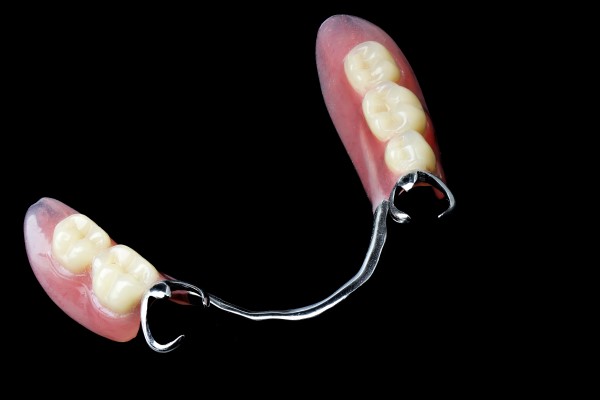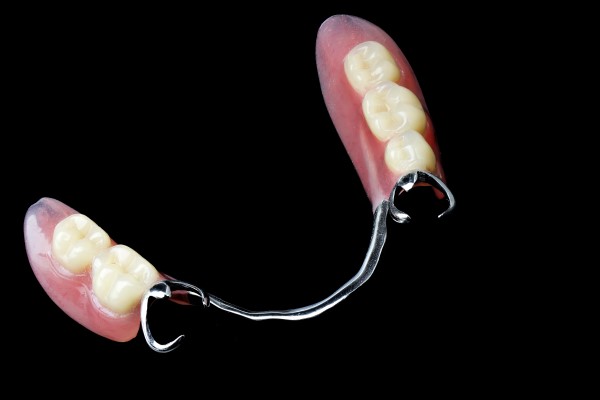What Are Partial Dentures?

Partial dentures are a popular replacement option for missing teeth. You could potentially benefit from them if you have lost some of your permanent teeth, but there are still some healthy ones that remain in the jaw. Your dentist can explain if you are a candidate for partials. If you are, you should learn all you can about them before you decide.
Common questions about partial dentures
If you are thinking about partials, you probably have many questions about them. Here are some of the things that people typically want to know.
Who qualifies for partial dentures?
Partial dentures are typically recommended for someone who has two or more missing teeth that are right next to each other. However, if you have multiple missing teeth that are not right next to each other, or if you are only missing one tooth, then you may need to seek out another treatment option.
Why would a dentist recommend partial dentures?
Tooth loss can cause extensive changes in the jaw. Because these changes can be detrimental, dentists prefer to leave healthy teeth in the jaw whenever possible and save extraction as a last resort. Partials are a way to retain healthy teeth while replacing those that are missing for a return to normal function and approximate appearance.
How are partials different from full dentures?
The most obvious difference is that a full set of dentures replaces all the teeth in the mouth while partials only replace some of them. However, there are other variations between the two. Partials have parts that full dentures lack. For example, partials usually have at least some metal components, while full sets typically have none.
How durable are partial dentures?
The durability of your partial dentures depends on the materials used and whether your healthcare provider gave you temporary or permanent partial dentures. Typically, metal dentures are the most durable, while plastic ones are easier to damage. There are also hybrids that are somewhere in the middle. Keep in mind that the term "permanent denture" is often misleading, too. Even a permanent denture option will need to be replaced every 5 or 10 years due to wear and tear.
What are the different parts of a partial denture?
A partial denture usually consists of these basic parts:
- Replacement teeth
- Plastic base to hold the replacement teeth
- Metal framework to support the plastic base with the teeth in it
How do partials stay in the mouth?
Partials stay in place partly because of clasps or other connectors that allow them to attach to the remaining adjacent teeth. The connections anchor the partial and hold it in place. Clasps may be made of plastic or metal. Other attachments may be more advanced. If desired, you can also use dental adhesive on your partials to help keep it from moving.
What are some of the different types of partials?
There are several ways to categorize partial dentures. They can be classified according to the materials used to make them, e.g., plastic bases versus metal bases versus lightweight thermoplastics with no metal also called flexible dentures.
Another way of categorizing partials is by the location of the teeth they are replacing. If the missing teeth are in the back, they are posterior partials, whereas anterior partials replace teeth missing from the front of the mouth.
How do you eat with partials?
When you first get your partial, you cannot go immediately back to eating the way you did before your tooth loss. It takes time to adjust to your new dental appliances. During this time, you should cut your food into small pieces and choose soft foods that are easier to chew. To maintain even pressure, you should practice chewing on both sides of the mouth at the same time. Even after the adjustment period, you should avoid hard or sticky foods.
Conclusion
If you have healthy teeth remaining in your jaw and your dentist wants you to keep them, a partial denture may be an option for the restoration of your missing teeth. Always be sure to talk through each option you have before making a decision. This way, you can be sure that you are making the right choice for yourself and your medical needs. Finally, be sure to give yourself time to adjust to the new dentures. It can take up to one month to use them properly.
Request an appointment here: https://www.palmbeachdentistry.com or call Palm Beach Dentistry at 5612252057 for an appointment in our Delray Beach office.
Check out what others are saying about our dental services on Yelp: Dentures and Partial Dentures in Delray Beach, FL.
Recent Posts
Dentures are a great solution for people who have lost some or all of their teeth. They can restore one's ability to eat and speak properly and improve the overall appearance of your smile. However, you may have questions about the denture process, from the initial consultation to the final fitting. This blog article will…
Those missing one or more teeth with healthy natural teeth can benefit from partial dentures. Not only do partial dentures help people chew food correctly, but they also restore the appearance of a smile. Choosing partial dentures allows a patient to regain comfort and confidence without complicated procedures.Partial dentures are removable oral appliances that fill…
Traditional dentures, or false teeth, are an effective way to replace missing teeth. While getting dentures is an exciting step, it is normal to be intimidated by the adjustment period. This article will dive into what patients can expect when getting dentures for the first time.It may take up to one month to fully adjust…
Many who have lost their natural teeth can smile confidently again, thanks to dentures. These oral appliances restore chewing, speaking function, and appearance after someone has lost a few or all of their teeth. Dentures come in a full set for those who have lost most or all of their teeth and a partial for…


